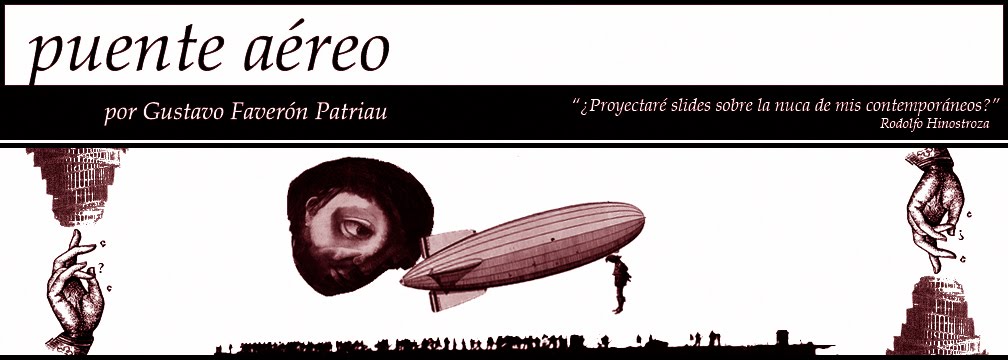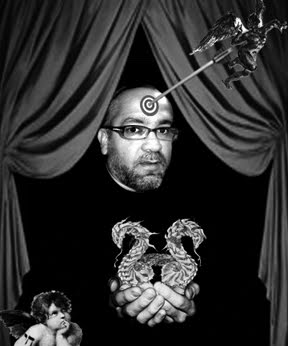 La sección Week in Review de The New York Times de hoy domingo 29 trajo un artículo informativo que recoge el estado de efervescencia que muchos ven en la escena literaria peruana recientemente.
La sección Week in Review de The New York Times de hoy domingo 29 trajo un artículo informativo que recoge el estado de efervescencia que muchos ven en la escena literaria peruana recientemente.El artículo se titula Past War and Cruelty: Peru´s Writers Bloom, algo así como "Tras la guerra y la crueldad, los escritores peruanos florecen".
En el texto, escrito por Simon Romero, tras la mención necesaria de los nombres de César Vallejo y Mario Vargas Llosa --acaso los únicos autores peruanos que resuenan rápidamente en los oídos de un norteamericano culto-- son especialmente citados Alonso Cueto y Santiago Roncagliolo, a raíz de sus novelas más recientes, y de los premios que ellas obtuvieron.
Otras fuentes (y/u objetos) del reportaje son el psicoanalista Jorge Bruce; el fundador de la editorial Estruendomudo, Álvaro Lasso; Julio Villanueva Chang, editor de la revista Etiqueta Negra, y una de sus manos derechas, el novelista Daniel Alarcón.
Los reportajes de este tipo, en la prensa norteamericana, no pasan del escritorio de un editor si no hay en ellos al menos una voz disonante.
En este caso, es la voz de Mirko Lauer, quien es citado diciendo que algunos de los libros más festejados recientemente son buenos pero no tanto ("not bad but nothing to write home about"), y que "los editores extranjeros han concedido premios en torno a un tema oportuno, las cicatrices de la guerra, para vender más" ("He said foreign publishers awarded prizes around a timely theme, the scars of war, to sell more books").
Respecto a las palabras de Lauer: supongo que algunos las tomarán escandalosamente. Creo que deben ser entendidas en dos partes: por un lado, está la opinión de Lauer sobre esas novelas, que él sabrá sustentar, si lo desea, tan lúcidamente como lo hace siempre en asuntos literarios. Y que los demás podrán discutir, como se debe. Por otro lado, está el reconocimiento de que los premios son enormes inversiones para una editorial, inversiones que deben redituar. Eso es alguien que nadie puede negar; es parte de la naturaleza del mercado editorial.
Si aprendemos a separar esas dos cosas, sin embargo, sabremos por qué un crítico nunca valora los premios como puntos a favor cuando evalúa una obra, y también por qué no se puede usar el argumento de la naturaleza comercial de los concursos para decir nada en contra de las obras ganadoras. No importa cuántos premios gane o pierda un libro: sus páginas están allí y se defienden solas.
Para quienes no tengan clave de acceso al NYT, dejo el artículo entre los comments de este post.











5 comentarios:
Artículo del New York Times
---------------------------
Past War and Cruelty,
Peru’s Writers Bloom
By SIMON ROMERO
Published: October 29, 2006
DOCKING here in a frigate in the 1840s, Herman Melville saw “the strangest, saddest city thou canst see.” Shrouded in gray clouds for much of the year, yet almost never getting enough rain to wash away the grit, Lima has long nourished writers who thrived on its brooding spirit, from the modernist poet César Vallejo to the novelist Mario Vargas Llosa.
Peru lost some of that in the grim 1980s and 90s, when a guerrilla war claimed more than 69,000 lives, and the government prevailed only through repression.
But Lima is once again one of Latin America’s brightest literary scenes, and in the last year, Peruvian writers have won prestigious literary prizes in the Spanish-speaking world for novels that deal with fallout from the war years and, in doing so, add to a growing literature of terrorism and the risks to democracy in fighting it.
Alonso Cueto, who lives in Lima, received the Herralde prize for “The Blue Hour,” about a lawyer who discovers that his father, a naval officer, oversaw the torture of political detainees.
Another Lima-born author, Santiago Roncagliolo, won the Alfaguara award for “Red April,” about a prosecutor who investigates a bizarre murder in Ayacucho, the region at the center of the violence between the Shining Path guerrillas and government forces.
Even if the plots evoke violence, sometimes in powerful language, the general style of writing is reflective and even casual, a relief from the darkness of the past.
“People here are still very melancholic but they are much more relaxed than they used to be,” said Álvaro Lasso, who two years ago founded Estruendo Mudo, a publishing house that has released more than a dozen books by Peruvian and foreign authors. “I’m hesitant to say this, but there is almost a sense of optimism in Lima.”
Hopefulness in Peru, of course, comes clouded in narratives that describe how war’s legacies seep into daily life. Adrian Ormache, the upper-class lawyer in Mr. Cueto’s book, finds his comfortable life disrupted when he encounters a woman who escaped captivity by his father; the shock prompts him to plunge into Lima’s demimonde of discothèques and roadside bars.
“His father and the Andean world were much closer than he thought,” Mr. Cueto said of the lawyer. “With its unresolved conflicts, Lima is an ideal place for a writer.”
Similarly, Mr. Roncagliolo questions the tacit approval of atrocities in a nominal democracy. In his book, a prosecutor is confronted with having experienced the war almost abstractly in Lima as it raged in Ayacucho, and in one passage, an officer challenges him: “I suppose you were reading little poems by Chocano. Literature, right? Literature says too many pretty things, Mr. Prosecutor. Too many. You intellectuals despise the military because we don’t read.”
In some ways, impoverished Peru is an unlikely spot for a literary renaissance. Its literacy rates trail those in countries like Mexico and Argentina. And literary exile is a longstanding tradition. Like Mr. Vargas Llosa, who returns to Lima from homes abroad for a few months each year, Mr. Roncagliolo lives abroad, in Spain, though exile is no longer synonymous with safety.
Painful revelations of the cruelties of the “internal war,” which essentially ended in 2000, still come to light. It was not until this month that Abimael Guzmán, the Shining Path’s messianic founder, was sentenced, to life in prison, after a chaotic retrial in 2004.
Today the mood is ambivalent — hesitant to be too hopeful. People seem intent on avoiding the potentially destabilizing populism that has swept Venezuela and Bolivia. The economy is growing, and Peru wants closer ties with Chile, a historical rival, and the United States.
“I remember the ritual of taking candles to parties in case of blackouts,” said Mr. Roncagliolo, who is writing a book on Mr. Guzmán. “As Peru’s situation improves, terrorism has become a global theme.”
The magazine Etiqueta Negra captures Peru’s new sense of breaking out of isolation. Founded five years ago, the monthly publishes narrative journalism by foreigners as diverse as the Polish writer Ryszard Kapuscinski and the American author Susan Orlean, as well as by Peruvian writers.
The magazine (its name, Black Label, is a riff on the whiskey) would not have been feasible a decade ago, when an insurgency that hung dogs from power lines, with Maoist slogans scrawled on their carcasses, targeted such enterprises as symbols of decadent thought. Now, Etiqueta Negra organizes its issues around largely apolitical themes like the bliss of sleeping.
“Many people still tell me the magazine doesn’t feel Peruvian,” said Julio Villanueva Chang, its editor. “The return of self-esteem in Peru, the overcoming of a feeling of defeat, is something recent.”
Some of the most praised writing is by Daniel Alarcón, an associate editor of the magazine who writes in English. Though born here, he grew up in Birmingham, Ala., and lives most of the year in Oakland, Calif. His story collection, “War by Candlelight,” was partly inspired by time living in San Juan de Lurigancho, a poor district of Lima.
“I sensed there was some kind of cultural jump happening,” said Mr. Alarcón, 29. “People whose grandparents spoke only Quechua were suddenly immersed in trance music.”
Not everyone is convinced Peru’s literary output merits high marks. Mirko Lauer, an accomplished writer here, said some recent books were “not bad but nothing to write home about.” He said foreign publishers had awarded prizes around a timely theme, the scars of war, to sell more books.
Perhaps so. But at home, the urgency to publish in a new and hopeful vein may be more substantive. Underneath their new celebration of cosmopolitanism, many Peruvians also wonder how long they will be able to enjoy political stability. “Peru, with its amalgam of cultures, lives in a state of latent war,” Mr. Cueto said last week.
After all, an ultranationalist former army officer, Ollanta Humala, nearly won the presidency this year. Last month, a judge charged Mr. Humala with human rights abuses related to his role in a counterinsurgency unit in the 1990s.
“This was the man who was within a breath of leading Peru,” said Jorge Bruce, a psychoanalyst and social commentator. “Now he is marginalized and shunned, but tomorrow who knows?”
sigo leyendo e informándome. este es un buen lugar!
ahhh!!!! capaz que ya lo hiciste, pero me gustaría una opinión yuya sobre la industria editorial. un panorama peruano. me he dado de lleno aquí con ese engranaje y noto que los editores trabajan bajo una lógica que se separa del escritor. el editor, no solo publica, acomoda el texto a la realidad del mercado...¿qué opinión tienes de eso?
un saludo!
laura
"que muchos ven"... crees que no existe esa efervescencia (que seguramente, como el 'saldeandrews', tendrá que bajar en algún momento)... parece casi coincidencia: una coyuntura en que resuenan los resultados de la cvr casi sepultados por toledo en que sentencian a abimael, en la que cueto y roncagliolo ganan premios por libros con temas relacionados a la violencia política, en la que aparece tu antología, en que el NYT se ocupa de esto... pero no sé si pueda tener explicaciones lógicas... creo que te lo pregunté de volada en la presentación de Toda la sangre, pero es acaso éste un momento 'especial' -digamos para destacarlo- en la literatura peruana? saludos.
Yo creo que más allá de la coyuntura menor (los premios y la aparente confluencia de obras de temática más o menos similar), la narrativa peruana es ahora bastante rica y compleja, no sé si más que en años anteriores. Quizá la gran diferencia esté en la proliferación de editoriales que llevan a esfuerzos nuevos. Mencionas mi antología, por ejemplo: esa antología es producto de una idea concebida originalmente por un editor (Ezio Neyra), lo que demuestra que el trabajo editorial bien entendido influye mucho en la "efervescencia" a la que te refieres.
Publicar un comentario